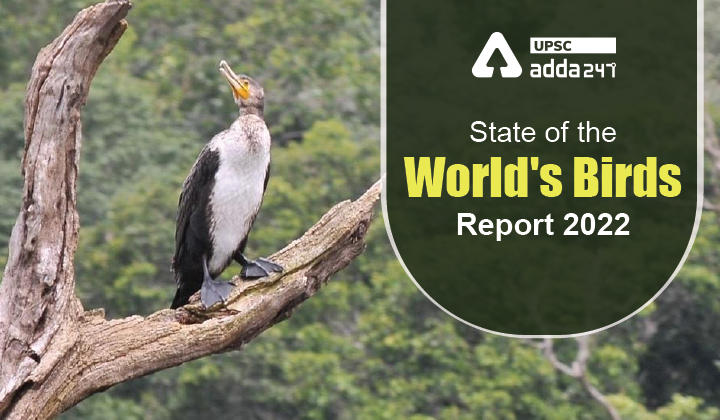Table of Contents
State of the World’s Birds Report UPSC: Relevance
- GS 3: Conservation, environmental pollution and degradation, environmental impact assessment.
State of the World’s Birds Birdlife: Context
- In the recently released State of the World’s Birds Report by Birdlife International, environmentalists have reported that expanding human footprint on the natural world and climate change is one of the major reasons of population decline of birds.
State of the World’s Birds Report: Key points
- The report has claimed that climate change is an important emerging driver of change in bird communities and a particular concern for tropical montane, polar, and migratory species.
- Global bird populations have steadily declined for the last three decades.
- Major reason of this reduction could be attributed to the continued growth of human footprint on the natural world, which has led to the degradation and loss of natural habitats, and the direct overexploitation of many species are the key threats to avian biodiversity.
- The use of 37% of the surviving bird species as pets and 14% as food are examples of direct overexploitation.
State of the World’s Birds Report 2022: Key findings
- Approximately 48 per cent of extant bird species worldwide (5,245) are known or suspected to be undergoing population declines, compared with 39 per cent (4,295) with stable trends, 6 per cent (676) showing increasing populations trends, and 7 per cent (778) with unknown trends.
- Habitat loss resulting from land-use change typically occurs concurrently with habitat fragmentation and habitat degradation, which interact synergistically to drive changes in avian community composition.
- The findings also states that human infrastructure and artificial light at night (ALAN, a form of pollution), impact the ability of migrating birds to access cues for navigation and orientation and act as a major sublethal impact to birds.
- Globally, there has been a deterioration in the conservation status of the majority of bird populations, including that of many formerly abundant species, especially at temperate latitudes.
- Threatened species are concentrated in the tropics, which host the richest avian diversity.
- The most significant threats to avian biodiversity are habitat loss, fragmentation, and degradation coupled with human overexploitation and invasive alien species.
- The study reports that birdwatching is a recommended form of avian conservation but warns of “local negative impacts” of bird feeding valued at $5-6 billion per year and growing by 4% annually.
State of the World’s Birds Report: India
- Apart from tropical forests, the threat of natural grasslands has been particularly worrying for North America, Europe and India.
- If unique ecosystems like grasslands are to retain their diverse birdlife, governments and research groups must prioritise such landscapes and their inhabitants for conservation and ensure that they do not become plantations or woodlands.
Read current affairs for UPSC




 TSPSC Group 1 Question Paper 2024, Downl...
TSPSC Group 1 Question Paper 2024, Downl...
 TSPSC Group 1 Answer key 2024 Out, Downl...
TSPSC Group 1 Answer key 2024 Out, Downl...
 Cabinet Ministers of India 2024, New Cab...
Cabinet Ministers of India 2024, New Cab...







